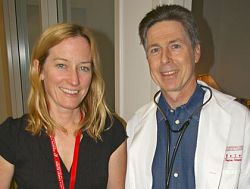Medical mission to Zimbabwe reveals a need for assistance

SALT LAKE CITY – Practicing medicine in Zimbabwe is much different than in the United States, Dr. David Smith learned as he visited hospitals and gave lectures on a medical mission to Zimbabwe March 9 through April 18. "Their resources are so limited, but I was impressed by their desire to help and do what they can with what they have," said Smith. "The cholera epidemic, which began in 2008, is continuing, as are malaria and HIV/AIDS." Smith was first introduced to Zimbabwe by Dr. Cephas Mujuruki, whom he met as a volunteer at the 4th Street Clinic. Mujuruki told him the only neurologist in Zimbabwe had been killed in a plane crash two years ago, and if he could go there it would be a blessing. Following an illness three years ago, Smith was forced to retire from his neurological practice, and after considering Mujuruki’s suggestion he wrote to the University of Zimbabwe in Harare, where Mujuruki had graduated in 2003, to let them know he was coming and to see if he could observe and give some lectures. "It was indeed our pleasure and honor to have Dr. Smith with us," said Dr. Midion Mapfumo, Oral and Maxillofacial Surgeon, Dean of the College of Health Sciences, University of Zimbabwe. "His lectures were most appreciated." The Most Rev. John C. Wester, bishop of Salt Lake City, said he was impressed with Dr. Smith’s desire to go to Zimbabwe to lecture as well as his concern with the spiritual welfare of the people. "He has great compassion for the charitable plight of the people in Zimbabwe and I admire his desire to reach out and help them." Smith spent two weeks observing at the University of Zimbabwe hospital and medical school and was shown the grand rounds and most challenging cases in each of the medical wards. "I started to get immersed in a new system of medicine," said Smith. "There are so few tests done in this 800-bed hospital. It is very selective who gets a CAT scan. They do not have an MRI machine. Dressing changes occur every other day instead of every day." She received a CAT scan, which was normal. It was his diagnosis that she needed a shunt as soon as possible, but they didn’t consider it important enough. A spinal fluid tap showed she had elevated pressure, but was otherwise normal. "The shunt could give this woman a decent chance of regaining her sight," said Smith, "so I talked to the neurosurgeon and he said he would put it on his schedule. They only operate one day a week and only do about four cases." Smith also visited the 130-bed Karanda Mission Hospital in northern Zimbabwe, where he delivered reusable surgical gowns and $13,000 in medical supplies for which he paid $2,000 from Globus Relief, which charges 15 percent of what supplies cost. "The Karanda Hospital was in such need that one of the doctors performed a C-section using only surgical gloves," said Dr. Smith. "The hospital relies on numerous donations." X-rays are common because they are cheaper, but there is not a radiologist to read them. "Guess work comes down to a lot of diagnoses for inpatients in hospitals, but they have become excellent clinicians without resources. It is like going back in time and relying on examination instead of testing. Whether or not they will be able to treat is another question. Maybe with a little help at the right time, it will happen."
© Copyright 2024 The Diocese of Salt Lake City. All rights reserved.

Stay Connected With Us